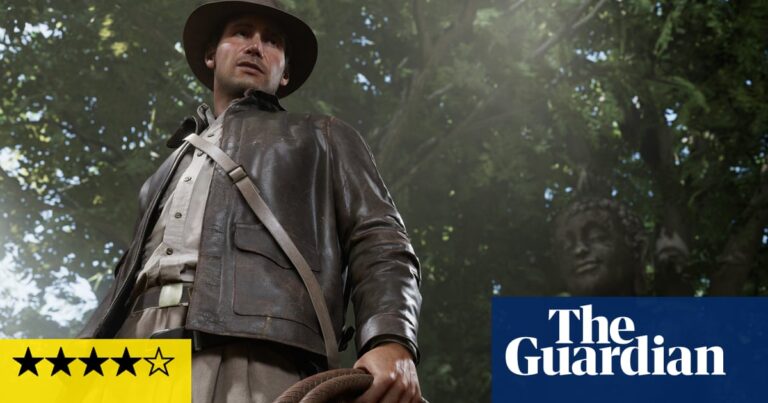Making an Indiana Jones game today seems like a straightforward endeavour: you take Uncharted’s Nathan Drake, send him back in time 80-odd years, give him a fedora and a bullwhip and sit back and watch the golden idols roll in. The Uncharted developer Naughty Dog perfected the template for Indy-inspired globetrotting action games more than a decade ago, and nobody would blame Swedish studio MachineGames if it stuck to it.
Indiana Jones and the Great Circle opts not to. Instead, it often goes out of its way to frustrate such comparisons. This unconventional blockbuster has more in common with games such as Dishonored and Hitman than it does with Uncharted. Sure, it has action and spectacle and occasionally dabbles in platforming, but it places far greater emphasis on puzzles, open-ended stealth, and letting you beat the snot out of fascists while dressed as a priest.
Set in 1937, between Raiders of the Lost Ark and The Last Crusade, The Great Circle puts Indy on the trail of a mysterious cult of giants, after one of its towering members breaks into Marshall College and steals a mummified cat from the institution’s archaeological exhibits. Although not the wildest setup for an adventure, it’s enough of an excuse for Indy to commence a sightseeing tour of several of the world’s most important historical landmarks.
His first port of call is Vatican City, where The Great Circle establishes the rules it will follow for much of its running time. Vatican City is a large, maze-y sandbox which players are free to explore at their own pace. Or they would be, were it not for all the fascists prowling around. The Holy See roils with Mussolini’s thugs, who will typically attack Indy on sight. You can fight them if you wish, but it’s generally better to evade enemies in public spaces by sneaking through back alleys, scrambling over rooftops, or acquiring disguises which will fool all but the sharpest-eyed officers.
Vatican City is an astonishing play-space: a vertiginous environment filled with hidden passageways, subterranean tombs, fenced-off guard camps, and a breathtaking recreation of the Sistine Chapel. You’ll spend several hours dashing between, over and under its buildings, and solving puzzles such as deciphering safe codes and unlocking elaborate ancient contraptions. There are numerous fascist-controlled areas to infiltrate, an underground boxing ring where you can test out the game’s first-person brawling, and even a side quest to find a missing cat.
The city is so exquisitely designed, in fact, that it overshadows the rest of the game. Which is remarkable when your next destination is the Pyramids of Giza. Here The Great Circle shifts into a more traditional open-world mode, less intricate and holistic, with more siloed locations and objectives. That said, it does afford greater room to experiment with Indy’s abilities.
In Indy’s dances with the Blackshirts and the Wehrmacht, The Great Circle aims to conjure the improvisational action of Spielberg’s films. Stealth is rarely mandatory but always viable; environments are littered with hammers, spades and trowels which are perfect for clonking against a Nazi’s braincase. In open combat, the brawling system combines straightforward fisticuffs with grappling and shoving, while landing a knockout blow produces some of the best simulated staggering since Grand Theft Auto IV. Guns are readily available, but using them feels like a failure of imagination. It’s more fun to whip your enemy’s firearm out of their hand, then lasso them towards you to feed them a triple-decker knuckle sandwich.
These systems are always fun to mess around with, and when added to the regular bouts of tomb raiding and more cinematic narrative intervals, it all amounts to a pleasingly varied experience. The game’s flexibility does come at the cost of pacing, however. For all its admirable qualities, The Great Circle does at times feel too leisurely for an Indiana Jones adventure. Both the first and second acts conclude oddly quietly, and would benefit from some Spielbergian fireworks to sign off with. Also, considering immersion is a major factor here, it’s odd that The Great Circle constantly pulls you out of its first-person perspective – often for cutscenes that look like they’d be rather more fun to play through.
Thankfully, the adventure kicks into a higher gear around the halfway point, leading into a third and final historical sandbox before gearing up for the grand finale. Taken as a whole, Indiana Jones and the Great Circle is a lavish, comprehensive and affectionate expansion of Spielberg’s films, one that keenly understands and eagerly engages with the history it weaves beneath its circular MacGuffin-hunt.
On this point, while The Great Circle mostly serves as breezy entertainment, there is a greater urgency than usual to the antifascist sentiment that runs through most of Indy’s adventures. The Great Circle doesn’t just let you punch Nazis, it acutely dissects far-right ideology as a whole, and actively explores how aspiring autocrats build their power on the bodies of disaffected young men. “Nothing is quite so easy to manipulate as an insecure male,” crows the game’s lead Nazi antagonist at one point. In this, The Great Circle shows that, far from belonging in a museum, Indiana Jones is more relevant than ever.
